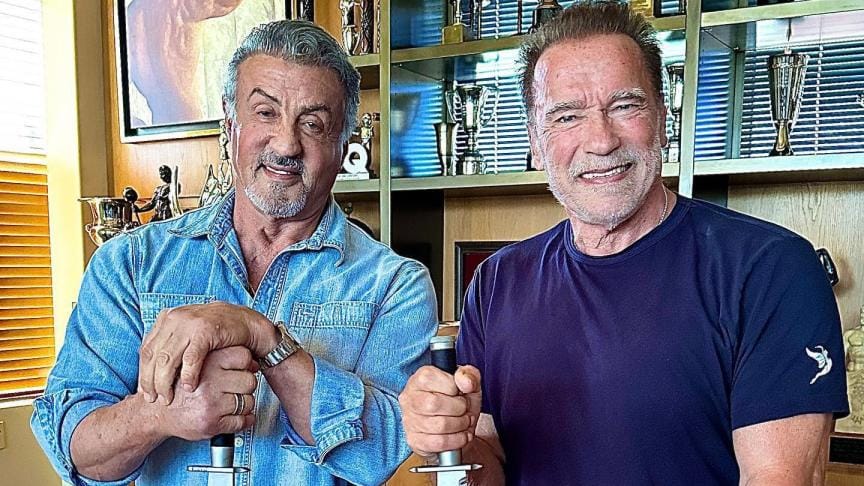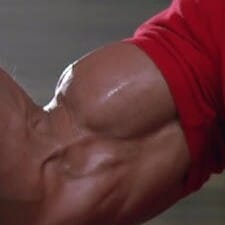Beef: Schwarzenegger v Stallone: chapter breakdown

Now that I've published the introduction and first chapter for free on this site, this is the structure and outline for the rest of the book as I currently envisage it. Please consider taking a paid subscription if you'd like to see it finished!
I'm still not sure what quote best fits the third chapter (all suggestions welcome - preferably one from Sly to balance things out):
Chapter 1: “It doesn’t feel pity, or remorse, or fear. And it will absolutely not stop ever.”
Chapter 2: “Do we get to win this time, sir?”
• Stallone retakes control of his career with Rambo First Blood: Part II; the simplified characterisation and jingoistic undercurrents usher in the 80s action film. Reagan jumps on the Rambo bandwagon, openly endorsing the franchise.
• Schwarzenegger launches direct attack on Stallone during 1985 press campaign for Commando; the movie is a reductio ad absurdum of Rambo, though able to laugh at itself.
• Rocky IV as the apotheosis of this cartoonish patriotism; Rambo production company Carolco begins to work with Schwarzenegger on Red Heat, which is more in tune with glasnost in its American-Russian pairing, embodying how Schwarzenegger is more circumspect than the unrepentantly flag-waving Stallone.
• These nationalistic, all-American films ironically relying on foreign pre-sales for profit, a model pioneered by Carolco and which became central to Hollywood in the 1990s.
Chapter 3: “————”
• Stallone marries Brigitte Nielsen in December 1985, while Schwarzenegger marries Maria Shriver in April 1986.
• The disputed story of how Stallone meets Nielsen in 1985: either when she slips a picture of herself under his hotel room door (their version); or because Schwarzenegger – who’d had an affair with her during the filming of Red Sonja – arranged for his lawyer to introduce them (alleged in the Laurence Leamer and Wendy Leigh biographies).
• The on-screen rivalry continues to heat up, with Stallone blatantly apeing and parodying Schwarzenegger in Cobra. The latter's further embrace of science-fiction in Predator and Running Man confirms his greater adaptability and forward-thinking. His personal attacks on Stallone continue in 1986, after which the latter privately makes contact.
Hollywood Danegeld
Chapter 4: “I hate Danish”
• Stallone files for divorce from Nielsen in July 1987, finalised in January 1988. Her career withers instantly, after starring with Stallone in Rocky IV and Cobra and with Eddie Murphy in Beverly Hill Cops II. Seemingly punished for her alleged infidelities and careerism, this alleged behaviour is in essence not very different from Schwarzenegger and Stallone’s well-documented escapades.
• Women as adornment in 80s action cinema. Despite their surprisingly large female fanbase and some outward signs of progression (Dawn Rae Chong’s proactive role in Commando; Schwarzenegger’s record of inter-racial lead couples in Commando, Predator, Running Man), Stallone and Schwarzenegger's films still mirrored an essentially patriarchal society. Nielsen’s fate emphasises this.
• Stallone scrapes the bottom of the barrel once again with the Rocky re-run Over the Top (arm-wrestling this time). Schwarzenegger also having his own struggles, with disappointing returns for Raw Deal, The Running Man and Red Heat.
Chapter 5: “I must break you”
• The acrimony culminates in a Playboy 1988 Schwarzenegger interview done without the authorisation of his publicist in which he rubbishes his rival at length.
• Stallone subsequently provides Schwarzenegger’s biographer Wendy Leigh with information leading to an exposé about his father’s Nazi past and encourages her to write a muck-racking biography. He later pays her legal fees when Schwarzenegger sues.
• The apex of the on-screen battle: Stallone pulls all the stops out with Rambo III, at the time the most expensive film ever made. But Schwarzenegger wrongfoots him by moving into comedy with Twins; it makes colossal box office, definitively putting him in the ascendancy against Stallone as he opts for back-end profits.
• August 1988 “truce meeting” between Schwarzenegger and Stallone brokered by Philadelphia socialite Harry Jay Katz.
Chapter 6: “Get your ass to Mars”
• The continued sparring between the two – mostly out of the press and restricted to their movies – now seems more commercially driven.
• Schwarzenegger consolidates the move into comedy with Kindergarten Cop. Stallone’s continued timidity of response, meekly following with Tango & Cash and Oscar.
• Total Recall as an unusually personal project driven through by Schwarzenegger; a meditation on the idea that there was something unreal about his gilded film-star existence, that he could have lived another life.
• Carolco’s role in facilitating the film, and inflating star salaries – primarily through the competition between Schwarzenegger and Stallone – across the industry. Terminator 2, again with Carolco, as his crowning triumph in this arena
What do you get when an Italian-American, an Austrian-American and a German-American walk into a restaurant?
Chapter 7: “Now I know why you cry”
• Full détente: the pair launch the Planet Hollywood restaurant chain in October 1991, with new action kid on the block Bruce Willis.
• Schwarzenegger outwardly triumphant in their head-to-head, tricking Stallone into doing Stop! Or My Mum Will Shoot.
• Action movies shift into less overtly macho and nationalistic terrain in the 1990s, with new stars like Willis, Nicolas Cage, Keanu Reeves, Will Smith.
• Stallone has a more solid and self-assured 90s – as augured by the downbeat Rocky V, which though a flop, shows signs he is connecting with “real” values beyond Hollywood (his son Sage co-stars). He goes on to have a big string of commercial hits in Cliffhanger, Demolition Man and The Specialist. Marrying Jennifer Flavin in 1995, he finally seems to have attained inner balance.
• Schwarzenegger’s movie career peters out in the second half of the 90s, but he is beginning to grow beyond it, envisaging a political career. The Stallone rivalry, his egotistical high point when he lost control of himself, may have been the point where he began to have a bigger, more social-minded and altruistic conception of himself.
Chapter 8: “I’ll be back”
• The two reunite in the 00s as senior action-movie ambassadors in The Expendables franchise and Escape Plan.
• Both men affirm their friendship and acknowledge the essential ludicrousness of the rivalry. But they also realise how it galvanised and changed them into moving beyond 80s narcissism.
• The meaning of the “geriaction” phenomenon: whether it was the unironic province of anti-wokers nostalgic for some outdated idea of masculinity, or something more complex.
• The enlightened former meatheads enjoy an evolved status as empowerment gurus in the social-media age, as they attempt to cement their legacy: Schwarzenegger through his Pump Club emails and book Be Useful, and Stallone through his podcast interviews with his daughters and generally more reflective attitude.

Member discussion